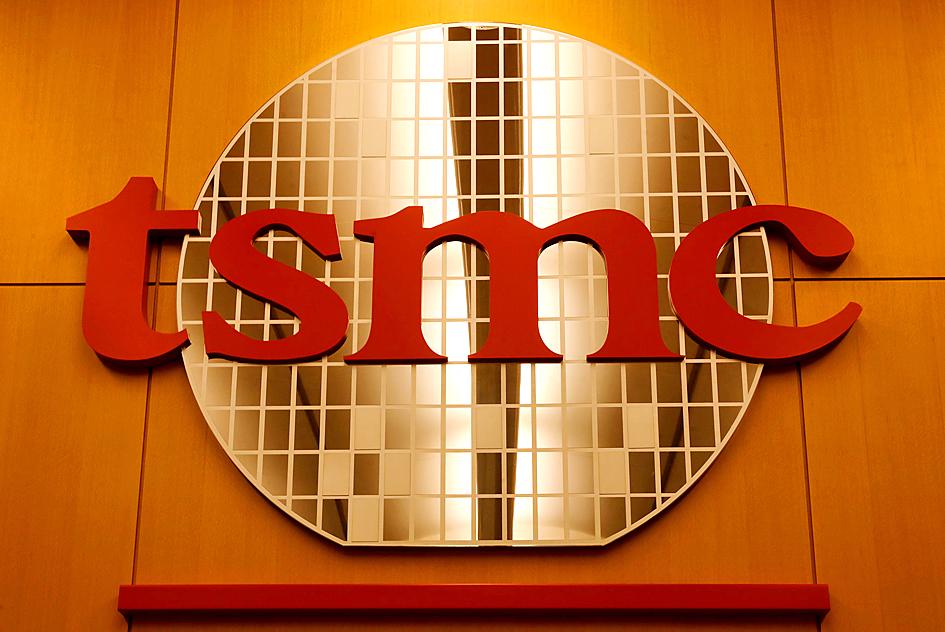Taiwan Semiconductor Manufacturing Co (TSMC, 台積電) reported that the US last year approved 99 percent of its patent applications, which placed the tech giant among the top patent holders in the US.
In its Corporate Social Responsibility Report, TSMC said it last year secured about 3,600 patents worldwide, including more than 2,300 in the US.
As of the end of last year, TSMC owned more than 39,000 patents, the report said.

Photo: Reuters
The company last year filed almost 6,500 patent applications worldwide and ranked among the top 10 patent applicants in the US. In Taiwan, it was the largest patent applicant for the fourth consecutive year.
As of the end of last year, TSMC had filed more than 55,000 patent applications worldwide.
The chipmaker, which has a more than 50 percent share of the world’s pure wafer foundry business, said that to protect its intellectual property, maintain a lead over its peers and boost its competitive edge, it is determined to strengthen its intellectual property portfolio.
Also in the report, TSMC said it last year spent US$2.96 billion on research and development (R&D), a new high in the company’s history.
Last year’s R&D spending rose 4 percent from a year earlier, with its R&D workforce growing 5 percent to 6,534.
The expenses amounted to about 8.5 percent of TSMC’s total sales last year.
The company has said it expects its R&D spending would equal 8.5 percent of its annual revenue until 2030.
TSMC reported record-high sales last year of NT$1.07 trillion, and forecast that sales this year would grow 14 to 19 percent, so its R&D spending is expected to reach another high, ranging between US$3.37 billion and US$3.52 billion.
Analysts said that TSMC’s R&D spending is the reason the chipmaker over the past few years has been able to serve as the sole processor provider to Apple Inc for iPhone production.
Through its R&D efforts, TSMC has also secured large orders from HiSilicon Technologies Co (海思半導體) — an integrated circuit design unit of Chinese telecom equipment supplier Huawei Technologies Co (華為) — and US clients such as Advanced Micro Devices Inc, Nvidia Corp and Qualcomm Inc, as well as Taiwanese IC designer MediaTek Inc (聯發科), analysts said.
Analysts also said that TSMC not only leads South Korean rival Samsung Electronics Co, but has also left its Chinese competitor Semiconductor Manufacturing International Corp (中芯國際) about two generations behind.

Sweeping policy changes under US Secretary of Health and Human Services Robert F. Kennedy Jr are having a chilling effect on vaccine makers as anti-vaccine rhetoric has turned into concrete changes in inoculation schedules and recommendations, investors and executives said. The administration of US President Donald Trump has in the past year upended vaccine recommendations, with the country last month ending its longstanding guidance that all children receive inoculations against flu, hepatitis A and other diseases. The unprecedented changes have led to diminished vaccine usage, hurt the investment case for some biotechs, and created a drag that would likely dent revenues and

Macronix International Co (旺宏), the world’s biggest NOR flash memory supplier, yesterday said it would spend NT$22 billion (US$699.1 million) on capacity expansion this year to increase its production of mid-to-low-density memory chips as the world’s major memorychip suppliers are phasing out the market. The company said its planned capital expenditures are about 11 times higher than the NT$1.8 billion it spent on new facilities and equipment last year. A majority of this year’s outlay would be allocated to step up capacity of multi-level cell (MLC) NAND flash memory chips, which are used in embedded multimedia cards (eMMC), a managed

CULPRITS: Factors that affected the slip included falling global crude oil prices, wait-and-see consumer attitudes due to US tariffs and a different Lunar New Year holiday schedule Taiwan’s retail sales ended a nine-year growth streak last year, slipping 0.2 percent from a year earlier as uncertainty over US tariff policies affected demand for durable goods, data released on Friday by the Ministry of Economic Affairs showed. Last year’s retail sales totaled NT$4.84 trillion (US$153.27 billion), down about NT$9.5 billion, or 0.2 percent, from 2024. Despite the decline, the figure was still the second-highest annual sales total on record. Ministry statistics department deputy head Chen Yu-fang (陳玉芳) said sales of cars, motorcycles and related products, which accounted for 17.4 percent of total retail rales last year, fell NT$68.1 billion, or

In the wake of strong global demand for AI applications, Taiwan’s export-oriented economy accelerated with the composite index of economic indicators flashing the first “red” light in December for one year, indicating the economy is in booming mode, the National Development Council (NDC) said yesterday. Moreover, the index of leading indicators, which gauges the potential state of the economy over the next six months, also moved higher in December amid growing optimism over the outlook, the NDC said. In December, the index of economic indicators rose one point from a month earlier to 38, at the lower end of the “red” light.